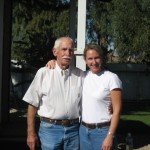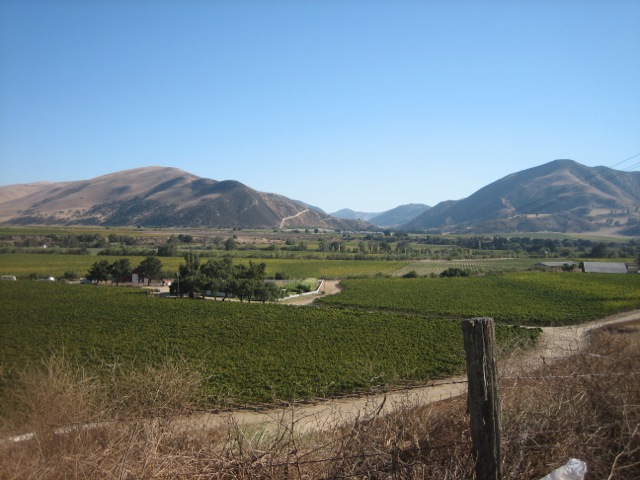
By Cami Beiter ~
James Lincoln Wood was known by many names.
“Jimmy” by close acquaintances. “Jim” by fellow ranchers, large equipment retailers and feed store owners. “Mr. Wood” by the many hispanic migrant workers he housed and employed. “Jimmy Lincoln”…only to the ladies or childhood friends did he hesitantly permit such reference.
As a young girl, I heard people refer to him by all his various monikers. I thought I detected a hint of hatred, a loathing…even jealousy when his name was said but also a level of respect and admiration, mixed with a healthy serving of fear. Jim Wood was a successful rancher, owning thousands of acres in the fertile Salinas Valley.
For many years, my mother dated Jim. He almost became my stepfather. I’m glad he didn’t, for my life would have been very different. It would have taken me away from the ocean, my friends, my school.
Still, for years many of my adolescent weekends were spent on his ranch…riding horses, working, complaining. In order to make the transition (and reality) of the weekly sacrifice more bearable, my mother would often treat me to McDonald’s before the long and winding drive into the valley. It was a temporary band-aid to the harsh reality of yet another weekend without my busy social life. Jim was considerably older than my mother, divorced with three grown children of his own. His child-rearing days had expired. He had no patience for kids, especially sassy ones.
He wasn’t a very tall man, yet always greeted others with a deep and exaggerated “HELLO!” His laugh was cackled by years of Merit soft pack cigarettes. His lips were dry and cracked from repetitive saliva moisture…blanketing them with his tongue after long, cherry-tipped drags. Even though he was a third generation Salinas Valley rancher and land owner, his hygiene was impeccable, his farmhouse clean and tidy. Bath towels were even fragrant and thick. His mother attended school in the same one-room school house as John Steinbeck. His grey hair obeyed his command, neatly combed with a wooden, soft bristle brush. His stiff rimmed cowboy hat was always in place. Even after many hours of riding, ranching and livestock feeding, I rarely saw a layer of sweat or collected ring of dirt on his forehead. He wore Aramis cologne, Wrangler jeans and expensive, well made, leather boots.
In the evenings, I read any and all The Black Stallion book series, Where the Red Fern Grows, The Summer Of Monkey’s. There was no such thing as cable. My selections were limited to The Lawrence Welk Show or the local news. Both were torturous.
Jim was an excellent horseman, a harsh businessman and unemotional when it came to livestock. I was nine the first time I saw a cattle drive. I remember sitting on a splintered fence, crying while watching the male calves being castrated and branded. He was a hard man, not easy to please. And although rare, when he dished out a complement, I hung on it, savored it. Through out the day I would remind myself I had done something worth his recognition.
His lessons were quick, feedback simple. When I failed to oil the tack properly, clean the horses stalls to his discretion or retaliate with a pre-adolescent attitude, he had a natural way of cutting you down to size with only a few words. A look of disappointment was enough instruction for improved work habits. He wasn’t afraid to hurt my feelings. To be candid, I often believed he liked it. As I grew into a 12-year old girl, even I knew encouragement, preserving ones self esteem while sparing the truth, wasn’t in his nature.
Yet, when the livestock were fed and chores done, I was free. Free to ride my horse, unchaperoned all over Steinbeck country. Free to feel the wind in my stringy blonde hair and breath to the rhythm of a strong gallop. I rode across the Salinas River more times than I can count, pretended to get lost deep in the valley. My landmarks were the seasonal agricultural fields, eucalyptus trees and rotating farm equipment. Migrant workers would stop and tip their hats as I rode by. AM radios echoed Mexican cha cha..often interrupted by Spanish speaking commercials.
When I first began riding, Jim would often say, “You ride like a sack of potatoes.” His tips were simple. “Keep your heels down, use your leg muscles and keep your ass in the seat. If you’re thrown, you better get back on.”
One fall afternoon, I saddled up my horse for a long ride. I looked away for a moment, throwing the grooming brushes in the tack bucket and my horse stepped directly on my foot. I pushed my body weight into his side as my other foot slipped in the dirt. His hoof rotated and my foot resembled a pancake. Unaware of what happened, he finally lifted his hoof. My toes throbbed like a panicked heartbeat. I stood in shock staring at a distant barn waiting for the pain to subside. I thought about Jim and his direct words about riding. I would get on and go. I hopped in the saddle, had a few choice words with my horse and went on my routine adventure.
Before dusk, I returned, unsaddled my horse, put the tack away and headed towards the house. I was filthy, full of river mud, with chilled sweaty clothes and tangled hair. Since muddy boots weren’t allowed in the house, I held my balance and attempted to remove the boot. Normally I hooked the heel on a porch step, pointing my foot while the boot easily slipped off. But there was no easy release. I knew something was wrong. I sat on an old oak stool while my mother slowly pulled the boot off my swollen foot. My dirty sock was covered with dried blood. Most of my toe nails had been ripped off. My mother grabbed an old stock pot and soaked my foot in warm salt water. There were no tears, no panic, not too much sympathy. Jim walked over, looked at my soaking foot and smiled. “Well, I’ll be damned. And you finished your ride?”
I smiled back at him. “Yes.”
He chuckled, took a drag of his cigarette. “Thatta-girl. You’re developing quite a seat. Make sure that mangy horse knows who’s boss.”
Hot damn! I didn’t know what was more bad ass… that I didn’t cry after getting my toe nails ripped off or Jim Wood noticing I no longer rode like a sack of potatoes.
I learned many things on that ranch. Most of them the hard way, but I’ve grown to understand and respect Jim’s old-school method. It’s been over 30 years since that particular afternoon, but I still remember as if it were yesterday. About ten years ago, during one of my trips home, my mom and I stopped by the ranch to say hello. Before driving down the long dirt road to the property, the “J.L.Wood Ranch” sign my mother made him years ago still swung above the entrance. It was no longer colorful. The mounted chain links had rusted. Along with a single bullet hole, the sign was now faded, aged by the elements.
We spent the afternoon with Jim, walking around the property, laughing and reminiscing about all things remembered. Jim no longer smoked, and he looked smaller, but he still radiated his raw and truthful manner. He still smelled of Aramis, still wore his stiff rimmed cowboy hat and expensive boots. And like the sign, he too was rusty, lost some of his color and had aged considerably. Retired from ranching, he now leased his land to major wineries. His fields no longer had the fragrant rows of broccoli, lettuce or beans, but acres upon acres of grapes.
Jim Wood has since died. But I will be forever grateful to that tough rancher who took the time to groom my character to include hard work and responsibility, even if I didn’t like it at the time.
His words stay with me to this day: “Keep your ass in the seat. If you’re thrown, you better get back on.”

